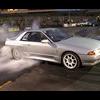Quoting power in hp, not kw
Announcements
-
Similar Content
-
Latest Posts
-
That makes sense.
-
It may not be relevant to your situation, but when I had the issue of air getting into the system on my GTT, I found there was a tiny hole in the aluminium cooling pipe. Enough for air to be drawn in, just not enough to cause a significant leak. Looked like the previous owner had chosen a bad place to attach the earth clamp of his welder and tried to mask this with a piece of mesh sleeving 🙄
-
Greater amount of energy is required to turn larger wheels up to speed, there for laggier. However bigger wheels are capable of flowing greater amount of air through both housings, let the engine burn more fuel and makes more power that way.
-
By Dose Pipe Sutututu · Posted
Super keen on the dyno results, make sure to post up ECU logs with RPM vs. MAP vs. ignition timing (if you want to disclose that). -
I thought that the high flowed rb25det turbos were a lot more responsive than the stock one? Would that mean better low end torque?
-






Recommended Posts
Create an account or sign in to comment
You need to be a member in order to leave a comment
Create an account
Sign up for a new account in our community. It's easy!
Register a new accountSign in
Already have an account? Sign in here.
Sign In Now